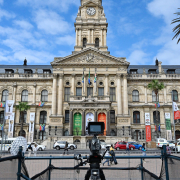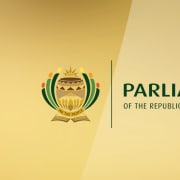|
Getting your Trinity Audio player ready...
|
Independent NGO Parliamentary Monitoring Group (PMG) has published a follow-up to its 2022 review of Parliament’s actions in response to the multi-part final report of the Zondo commission into state capture.
The first report is titled Where was Parliament? and the follow-up is A PMG Review of Parliament’s Processing of the State Capture Commission Report.
Both reports seek to establish what the legislature has done since Chief Justice Raymond Zondo – the commission’s chairperson – released his findings and recommendations, and to present PMG’s views on how Parliament can strengthen its oversight processes, specifically those related to the committee system. The committee system, says PMG, is the primary platform for oversight, and in this the organisation and commission agree.
Taking a step-by-step approach to the Zondo commission’s recommendations that pertain particularly to Parliament, PMG addresses each one in terms of the action parliamentary committees have taken and the discussions that have been held to date, and makes suggestions to improve each one.
The organisation also scrutinises the steps taken by the parliamentary Ethics Committee to hold accountable those MPs that were found, through evidence brought before the commission, to have breached the ethics code. Three of them – Cedrick Frolick, Thulas Nxesi, and the late Tina Joemat-Pettersson – were cleared of wrongdoing although the reports on why they were cleared have yet to be released, says PMG. Meanwhile, another two MPs – Pinky Kekana and Mosebenzi Zwane – were reprimanded, and there were other consequences for Zwane.
In addition, PMG assesses Parliament’s work in addressing the action plan developed and submitted by President Cyril Ramaphosa as a response to the Zondo commission’s recommendations. “On 23 November 2022, the NA Rules Committee accepted the President’s response plan and agreed that the relevant committees would have a deadline of six months to implement the recommendations or at least release a preliminary report on their work.”
Not much concrete progress
The pace of work on implementing the recommendations is slow, complicating efforts to accurately assess the progress.
“The processes relating to the implementation of the recommendations have only gotten under way,” notes PMG, “so it is not possible to make a definitive assessment of the impact thus far … overall, our sense is the implementation of the Zondo recommendations has been a tick-box exercise and a missed opportunity in some respects.”
In terms of accountability and oversight, says PMG, Parliament cannot be said to have excelled, its performance being something of a mixed bag. For instance, its decision to reject the findings of an independent panel on the Phala Phala matter “has been widely criticised and viewed as another example of oversight failure.”
Municipal dysfunctionality continues apace with no or minimal impact and intervention from the legislature, as do numerous other problems. On the other hand, says PMG, “the legislature’s approach to the Thabo Bester matter, the Eskom investigation, and deliberations on matters brought forward by civil society are indications of improved oversight”.
In June 2023 it was made known that committee chairpersons had been requested to include, in their quarterly programmes, their tasks relating to the processing of the report. Furthermore, this would be monitored closely, “specifically on how chairpersons were integrating the processing of the report into their work”.
PMG’s research shows that in reality, not much is happening on this front. “Many committees have not done much work concerning this and we cannot confirm whether they met the deadline.”
Besides Parliament’s three rules committees, 15 portfolio committees are involved in the implementation (see section below) but, says PMG, only two of the 15 – the portfolio committees on Home Affairs, and Public Service and Administration – were found to have submitted their quarterly update report. Meanwhile, the Trade, Industry and Competition, and Police committees met in June to discuss their work in giving effect to the Zondo recommendations.
Given this worrying lag in getting to work on the recommendations, the real question, asks the organisation, is whether Parliament would act any differently as an institution if state capture flared up again.
But there is another weapon readily available which will prove invaluable, should Parliament choose to maximise its use – in overseeing the overseers, the role of civil society cannot be ignored. “Civil society needs to be a vigilant and vocal voice in supporting effective oversight.”
This is because relationships between civil society and government are beneficial in several ways. “Given that resources are constrained for committees, soliciting input from civil society and making use of credible media exposés when conducting oversight meetings will broaden and expand the material committees can draw from when conducting oversight.”
An additional incentive for this, says PMG, is that often, the true extent of oversight, whether good or bad, is revealed only in media-driven, breaking news cases. Testimony from the Zondo commission demonstrated this, providing a poor reflection on Parliament’s lack of oversight during the height of the state capture era.
What it boils down to, says PMG, is that when it comes to the high-profile matters that have a far-reaching impact especially in terms of corruption, Parliament is dropping the ball.
The scene thus far
President Cyril Ramaphosa submitted an implementation plan, in response to Zondo’s recommendations, in October 2022. The final part of Zondo’s multi-edition report had been submitted in June, and Parliament began to process the Zondo report formally and substantively in November of that year.
At a meeting on 23 November, the National Assembly (NA) Rules Committee adopted a 31-page implementation plan to deal with the commission’s 16 recommendations that focused specifically on Parliament’s oversight and accountability role. According to the plan, says PMG, “recommendations would be forwarded to the appropriate portfolio committees of the NA and the National Council of Provinces (NCOP), while proposed constitutional changes would be referred to the Joint Constitutional Review Committee.”
Members agreed that there should be timeframes for each designated committee to report back to the NA and NCOP rules committees, in addition to the Joint Rules Committee – these three committees would take the lead in processing the recommendations. Another 15 committees would be involved in the implementation of the Ramaphosa action plan.
Parliament’s response to the recommendations is two-pronged as it addresses the recommendations on its own functioning as well as those which concern the Executive – the latter are addressed in the president’s implementation plan.
“At that same meeting, the NA Rules Committee decided to give designated committees six months to finish their work of processing the recommendations or, at the very least, release a preliminary report,” says PMG, “but also mindful that other recommendations might have constitutional implications that may only be realised after the 2024 elections.”








